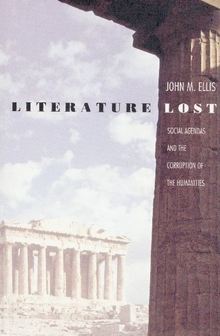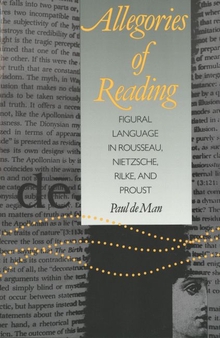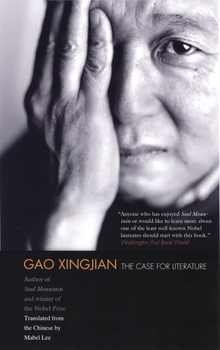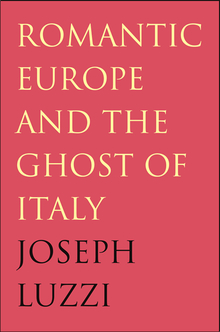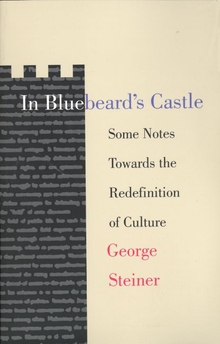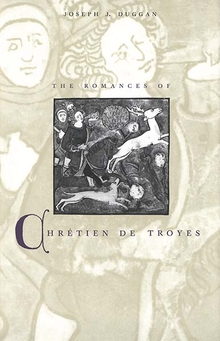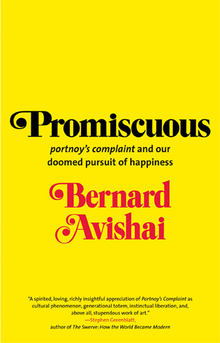Literature Lost
WARNING
You are viewing an older version of the Yalebooks website. Please visit out new website with more updated information and a better user experience: https://www.yalebooks.com
Social Agendas and the Corruption of the Humanities
John M. Ellis
Ellis begins by showing that political correctness is a recurring impulse of Western society and one that has a discouraging history. He reveals the contradictions and misconceptions that surround the new orthodoxy and demonstrates how it is most deficient just where it imagines itself to be superior. Ellis contends that humanistic education today, far from being historically aware, relies on anachronistic thinking; far from being skeptical of Western values, represents a ruthless and unskeptical Western extremism; far from being valuable in bringing political perspectives to bear, presents politics that are crude and unreal; far from being sophisticated in matters of "theory," is largely ignorant of the range and history of critical theory; far from valuing diversity, is unable to respond to the great sweep of literature. In a concluding chapter, Ellis surveys the damage that has been done to higher education and examines the prospects for change.
"Using history and logic, John Ellis rebuts a set of social and theoretical claims that have undermined the teaching of literature in our colleges for twenty years. A convincing diagnosis of a serious malady."—Roger Shattuck
"Ellis's humanist dislike of cant and jargon is well matched with his open-mindedness about the values of literature."—Kirkus Reviews
"[Ellis] is not the first...to express dismay at [the extraordinary changes that have come over the teaching of the humanities in American universities]; what distinguishes him is the clarity of his perceptions, and his willingness not merely to deplore the new trends but—faithful to an academic tradition he believes to be in serious danger—to subject them to disinterested inquiry....He argues honestly, with all his cards on the table."—Frank Kermode, Atlantic Monthly
"An eloquent passionate plea for the 'wider world' to engage itself with academia and bring it to its senses, lest literature and the arts be trampled beyond recognition by the armies of the alienated professoriat."—Jonathan Yardley, Washington Post Book World
"[An] exceptionally persuasive book . . . which ought to be required reading for any student about to enroll in a literature course. . . . This lucidly written book offers one of the most insightful analyses of the problem. . . . Ellis writes an elegantly crisp, plain English that makes his arguments quite easy to follow. His book deserves the widest possible audience."—Merle Rubin, Baltimore Sun
"As clearly written as its arguments are cogent. . . . More important, however, is the way Ellis's book addresses the problems that confront us as a nation of readers, and most particularly that portion of this population who wonder if the college education their children will receive is worth the hefty sticker price. If every literature professor were a John Ellis, I suspect parents would rest much easier; and if his book has anything like its desired effect, that may yet become a happy case."—Sanford Pinsker, The Providence Journal Bulletin
"[This book] should be read by anyone paying to send a student to college, and especially by any student seriously considering a career as a teacher of literature. It's as sobering as the Surgeon General's warning on your cigarette pack, and as true. . . . Its passion is authentic, its logic is impeccable, and its argument demands attention from anyone concerned with the present state of our intellectual, which is to say spiritual, life."—Frank McConnell, San Jose Mercury News
"An eloquent, passionate plea for the 'wider world' to engage itself with academia and bring it to its senses, lest literature and the arts be trampled beyond recognition by the armies of the alienated professoriat."—Jonathan Yardley, International Herald Tribune (Paris, France)
"For all the sloganeering about 'diversity' on college campuses across the country, the one diversity too often absent is intellectual diversity. That's the dirty little secret that John M. Ellis takes on in his wonderfully refreshing Literature Lost. . . Ellis’ argument is categorical, thorough, precise, enlightening, and devastating. . . He is conversant with the history of ideas, the provenance of important arguments, the epistemology of his subject, in a way that current theorists generally are not. . . One by one, Ellis takes on the governing tenets of the race-gender-class critics and exposes their faulty foundations in illogic, ignorance, and contradictory experience."—Philip Gerard, World & I
"Ellis has made a convincing case for an increasingly unpopular notion—that of literature as something which 'enables us to see ourselves in perspective, to become more enlightened citizens and to think more deeply about important issues in our lives.' For that, we are in his debt. One can only hope his call will be heeded."—Kevin Driscoll, Washington Times
"An exposition so intelligent and elegant, whose caustic remarks are more satisfyingly dry than those of its adversaries."—Howard Young, Times Higher Education Supplement
"Literature Lost is an eminently readable, insightful, and thought-provoking book that goes far beyond the often touristy and shallow journalistic critiques of academic political correctness. . . To his credit, Ellis is anything but a reactionary ideologue. Indeed, the great virtue of Literature Lost is that it engages in extended, informed, and open argument. . . . In articulating his case as well as he does, Ellis also underscores the primary way change happens, at least in the intellectual marketplace: through the force of ideas."—Nick Gillespie, Reason
"Literature Lost deserves to be widely read and discussed for its searching critique of the current orthodoxy in literary studies."—Wilbur S. Braden, Philosophy and Literature
"John Ellis is painfully aware of how even well-meaning practices can end up creating students who know everything about novels or poems except why one should love them. . . . His book makes an eloquent case for a more serious study of history and literature that would enable all students 'to gain a broader perspective on recent events in their country and to see them as part of a historical pattern in which the effects of the Enlightenment are still being played out.'. . . John Ellis has sharpened the terms of a debate usually more notable for its heat than its light, while many others will see in his work an honorable position worth rallying around."—Sanford Pinsker, Georgia Review
"His prose is clear, simple and direct, and he displays an integrity of intellectual character that contrasts appealingly with the sophistry and hypocrisy that so often characterize contemporary critical theory."—Joseph Carroll, Times Literary Supplement
"Ellis writes well and makes a useful contribution to the debate about the direction of literature departments. He has read widely and culled provocative quotations that make his opponents seem misguided and foolish."—Journal of English and Germanic Philology
"With this analysis, Ellis makes a significant contribution to discussions of the deep, pervasive changes in humanist studies and—consequently—throughout academia. . . . An important title for upper-division undergraduates through faculty."—Choice
"Ellis is hardly alone in pointing out that literary study is currently going through a bad patch but he is perhaps the first to systematically investigate just how corrupting the relentless attack on the Western tradition and on traditional literary scholarship has been. Ellis’ critique, informed as it is by rigorous logic and an abiding sense of history, performs a valuable service in an age that easily adjusts to the most startling of changes. In deed, his book makes an eloquent case for a more serious study of history and literature. Even those who find themselves disagreeing with virtually every sentence in Literature Lost will be forced to admit that John Ellis has sharpened the terms of a debate usually more notable for its heat than its light, while many others will see in his work an honorable position worth rallying around." —Sanford Pinsker, The Georgia Review
"A thorough and masterfully rational study of the issues behind the conflict."—John W. Aldridge, Wall Street Journal
"Ellis's humanist dislike of cant and jargon is well matched with his open-mindedness about the values of literature."—Kirkus Reviews
"[Ellis] is not the first...to express dismay at [the extraordinary changes that have come over the teaching of the humanities in American universities]; what distinguishes him is the clarity of his perceptions, and his willingness not merely to deplore the new trends but—faithful to an academic tradition he believes to be in serious danger—to subject them to disinterested inquiry. . . . He argues honestly, with all his cards on the table."—Frank Kermode, Atlantic Monthly
"Sparks fly in this polemical look at the growth industry in 'race-gender-class' theorists who threaten to reduce literature to mere tools of oppression."—Publishers Weekly
"Elllis’s eloquent new book. . . steps back to consider the fate of the humanities—and literary studies in particular—in the age of political correctness."—Roger Kimball, The Weekly Standard
"In its clarity and concise expression, Literature Lost is a model of perfection. . . . What differentiates Ellis's study from the larger body of the recent return to the older standards is its detailed and careful analysis of the arguments of his opponents and its strong dependence on the evidence of history in his arguments. . . . In its range of scholarly knowledge, its interpretive power, and effective polemic, Literature Lost presents a formidable foe to a vast variety of post modernist theorists and scholars."—Robert D. Spector, World Literature Today
"For this performance, which is full of vim and vigor, Ellis deserves plaudits and respect."—Wulf Rehder, Hungry Mind Review
"In his characteristic clear-headed way Ellis directs his attention to the historical and philosophical dimensions of the problem, as befits the author of previous incisive books on literary theory and deconstruction."—Harold Fromm, The Hudson Review
"[This book] eloquently decries the state of contemporary literature study and the teaching of literature of America’s universities and colleges. . . [A] powerfully reasoned critique."—David Ratner, Register Pajaronian
"Ellis goes toe to toe with some of academe's most sacred icons, from Stanley fish to Fredric Jameson, and he leaves them reeling, lashed by his deft use of their own words. What empowers Ellis's book is his inexhaustible knowledge of Western history and culture and his logician's ability to expose faulty reasoning even in the highest halls of academe."—Jeanne J. Smoot, The Comparatist, Journal of the Southern Literature Association
"[An] indispensable book. . . . Ellis is extraordinarily courageous, fearless really, in the particularity of his indictment."—Norman Fruman, Academic Questions
"Ellis's book is a powerful and extremely lucid analysis of what has been going on—and what has been wrong with what is going on—in the study of the humanities in universities over the past decade and a half. His argument is always logical, his writing refreshingly direct and free of jargon."—John Hollander
Publication Date: April 10, 1999

